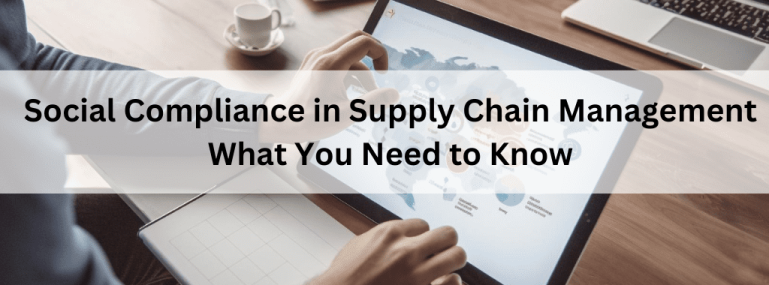The management of social compliance is an integral part of supply chain management. To ensure that all parties involved in the production and delivery of goods adhere to ethical, societal, and environmental standards. A company’s reputation is more likely to be positive if it prioritizes social compliance in its supply chain management practices. Furthermore, they increase customer loyalty and reduce legal and reputational risks. Companies should also prioritize compliance with labor laws and regulations to ensure fair and safe working conditions for their employees. This will not only improve the company’s reputation but also increase employee satisfaction and morale.
The importance of social compliance in supply chain management can be summed up as follows:
- Ethical Responsibility: In order to ensure ethical and responsible supplier behavior, companies have an ethical responsibility. These include fair labor practices, safe working conditions, and responsible sourcing of materials. It is possible for companies to avoid supporting exploitative practices and engaging in unethical conduct by prioritizing social compliance. Companies should prioritize social compliance to ensure that suppliers are held to the same ethical standards as the company itself. This can be done by developing and enforcing a clear Code of Conduct that is regularly monitored. These efforts will ensure that companies are not supporting unethical practices.
- Legal Obligations: Most countries have laws and regulations that govern labor practices, human rights, and environmental standards. A violation of these regulations can result in legal penalties, fines, and even criminal charges. Companies can avoid legal and financial risks associated with supply chain management by ensuring social compliance. Companies can do this by conducting audits of suppliers, ensuring that they adhere to the laws and regulations.
- Reputation: A company’s reputation is closely linked to its social compliance. Business ethics and responsible practices are becoming increasingly important to customers and investors. Prioritizing social compliance can help companies build a positive reputation and increase customer loyalty, leading to increased sales and profits. Therefore, companies should strive to be socially responsible and ensure they are compliant with relevant regulations. It is also important for companies to be transparent in their practices and communicate clearly with stakeholders about their commitments.
- Risk Management: Non-compliance with social standards can cause supply chain disruptions, resulting in production delays, product recalls, and other problems. Companies can minimize these risks and ensure the smooth operation of their supply chains by ensuring social compliance. Companies should set clear social standards and monitor their supply chains regularly to ensure compliance. They should also work with suppliers to ensure that they understand and adhere to these standards. Lastly, companies should act if any breach of social compliance is detected.
- Sustainability: The importance of social compliance in sustainable business practices cannot be overstated. Sustainability can be promoted by ensuring suppliers operate responsibly so that environmental impact can be reduced, sustainable materials can be sourced, and a more sustainable future can be achieved. This can be done through rigorous auditing and monitoring of suppliers’ operations, as well as implementing and enforcing social compliance standards. Companies should also strive for transparency in the supply chain to ensure that all suppliers are meeting social compliance requirements.
In conclusion, social compliance is a critical aspect of supply chain management that benefits companies, suppliers, and society. By prioritizing social compliance, companies can ensure that their supply chains operate ethically, responsibly, and sustainably. This is while mitigating risks and building a positive reputation.
ComplianceXL provides a platform to create, manage and monitor social compliance programs. This ensures that companies remain compliant with social compliance regulations. Additionally, this helps companies foster relationships with stakeholders and improve supply chain efficiency. Contact Us Today!!!





